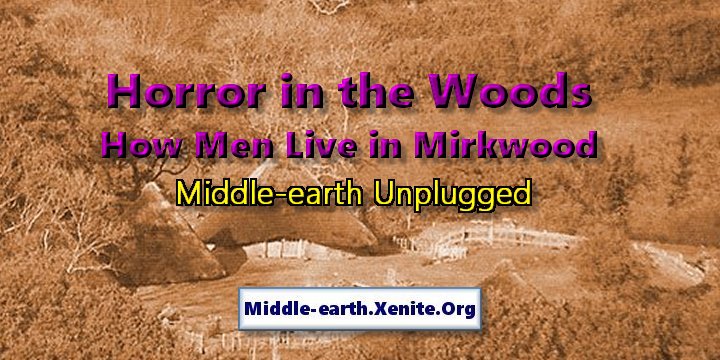
Our journey begins just after dawn. Our guides lead us down to the river when the morning fog is still thick upon the water. They show us to a small hythe where unbelievably light, thin boats are drawn up on the grass. For a pilgrimage on the Great River one would almost want a ship, although the river is not navigable this far north of Osgiliath. Large boats are not used north of Cair Andros. Beyond the borders of ancient Gondor Men are left to their own devices in facing the perils of Wilderland.
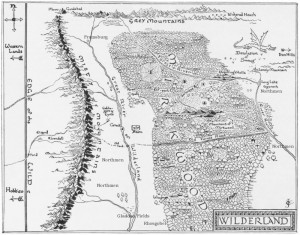
Every face in our party is grim. There are Elves among us, messengers from Rivendell over the mountains, and perhaps others. But even they are quiet as they select their boats and prepare for the crossing. The young men laugh nervously but softly. They are torn between wanting to show their courage and not attracting unwanted attention from across the river.
On this side, the western bank, there are friendly peoples to the north and south of our position. North lie villages of Men, pressing into the sheltered vales of the Misty Mountains and encroaching upon the northward plains. To south is the ancient land of Lothlorien, a land of Elves and legends. Few men claim to have spoken with the Elves of the hidden land. They speak of it in fear and awe. Still, it is said that Orcs and foreign men do not go near the woodlands. Nervous glances are only cast toward the river.
Here in the northern Vales of Anduin there are many men, though it is said their numbers are but a fraction of a once thriving population that existed thousands of years ago. How long men have dwelt in these lands no one knows. The Elves say their ancestors were the first speaking peoples to cross the river. The forests knew nothing but the songs of Elven clans for countless ages.
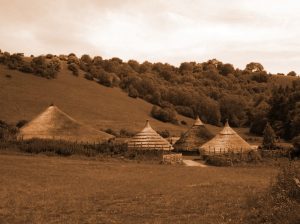
Yet in time men emerged from the great forest on the far side of the river. Staring upon the immense flow of water some of them were daunted and they never passed farther west. Yet some few pressed onward, eventually crossing over the mountains to claim large tracts of Eriador which had been abandoned by the Elves. And from Eriador a very small number, perhaps no more than 10,000 all together, wandered into ancient Beleriand, the legendary land of the High Elves where it is said they fought a long, hopeless war against the first Dark Lord.
Beleriand is gone, buried under the waves of the sea. Its once mighty nations of Elves have vanished into the depths of time. The descendants of the men who wandered into those legendary realms sailed over sea and lived in another land now buried beneath the waves: Numenor. A few of their kind returned to Middle-earth to claim it for themselves and their descendants.
Like the High Elves of Lindon and Rivendell the Numenoreans who founded Arnor and Gondor called themselves Exiles. Their true home, they said, was in the West that is lost to them forever. And yet though the reach of the Numenoreans was long, it was barely felt in these lands. Elendil the Tall and his Elven allies marched through these lands on their way to fight the second Dark Lord. Most of their soldiers never returned, although historians in Gondor say that the majority of Elendil’s surviving soldiers passed north through Calenardhon and Enedwaith rather than retrace their steps along the Anduin.
Armies have fought here since time immemorial. The Men of the Vales of Anduin have been friendly with the Elves on both sides of the river. They were allies of the great alliance led by Elendil and Gil-galad, the last High King of the Elves of the West. But though these Northmen have often fought the servants of the dark lords and their emissaries, they have also fought with Dwarves and each other. They are proud and courageous and strong. Some of their clans take pride in challenging the Orcs of both the mountains and the great forest.
Today there are no armies. There are no kings. All the ancient kings who once ruled these lands have been buried and forgotten for centuries. Men live in quiet villages, trading only with their neighbors or the occasional wandering Dwarves. They honor the rare Elven visitations with feasts and provide them with escorts when required. And any Elf need only but ask for passage across the river, Men leap to fulfill the request without question. We waited for days for an Eahward, a river warden. When the Elves showed up a local chieftain appointed one who immediately set about recruiting men and boats. The message was not lost on us: people do not cross the Anduin lightly.
And there is a certain sense to the custom. The river-wardens are the bravest men among the locals. They risk their lives not only in mastering the currents of the great river but also in daring to step ashore on the eastern bank. All the Northmen we spoke to say their ancestors fled across the river long ago — or more recently. Families leave the forest every year, seeking the relative safety of the western banks and valleys. The mere threat of Orcs and Wargs raiding their villages at night is preferable to the life they lead in the forest.
And that is why we want to cross the river. We want to meet the WiduManna, the Men of the Woods. There are many names for them on this side of the river: Giddymen, Wodhsmen, and sometimes just “the Brave Folk”. We call them the Woodmen, the Woodmen of Mirkwood.
The river-wardens plot a slightly northward course as they steer our boats across the river. We slice into the fog as the rowers seem to fight the current. In fact they are only using their oars to push the boats farther into the water. The river does most of the work, pushing us south as well as east. Our destination on the far side is south of our starting point, a small landing place the river wardens maintain across from the Gladden Fields.
The Gladden river flows down from the Misty Mountains into a small marshland where the waters neither run deep nor fast. In times past there were villages here of both men and smaller dwellers, Stoors. These cousins of the Hobbits of the Shire refused to cross the mountains, or else fled east from the wars that ravaged Eriador, taking Arnor’s people down into oblivion. When we ask about the Stoors, however, our guides shake their heads. No one has seen the little men for many years. Their fate is uncertain.
There are other men who live on the eastern shores of Anduin, especially near the southern eaves of the forest. Their tribes came from the east almost a thousand years ago. In the past the Men of the East were more concerned with attacking Gondor, but Gondor grew weak. It’s true that a tribe of Northmen settled in Calenardhon. The Eotheod, or Horse Folk, left the upper Vales of Anduin to become Gondor’s closest friends and allies. They fought many wars with the eastern tribes. Sometimes men from the forest or the western shores wander down to the Mark and take service with the Riders, so they can hone their skills in battle — or perhaps just to seek revenge against their ancient enemies.
We arrive at the landing across from the Gladden Fields as the fog is lifting. Scouts leap ashore and move inland. They signal that all is clear and our rowers pull up to a well-disguised wooden dock. They tie up the boat and offload our gear. But not one man offers to stay behind. They look up at the rising lands toward the dark line of the forest and shudder. It casts a pall upon their spirits even though they are well-armed. Many have fought in hard battles against the goblins and wargs who menace their villages across the river. They cannot shed the sense of fear and doom that almost sweeps down from the treeline toward us.
The feeling is palpable. It is almost as if the forest is possessed by a grim will that opposes anything which does not serve its purposes. The Great Will daunts even the strongest men, it is said. Dwarves of ancient heritage have been reduced to gibbering madness. Even the Elves do not speak of what dwells there. But our eyes are drawn southward toward the rising slopes that recede into the wilderness. We cannot see it but we know it is there: Dol Guldur, the Hill of Dark Sorcery.
A madness almost seizes our companions as they pile back into their boats. Even the scouts, the bravest men in the company, are ready to leave. They will follow the river north for several miles before turning out into the current and heading home. It won’t be until they approach the far side that they breathe more easily. The dangers that threaten their families they know how to deal with. The power that emanates from Dol Guldur is beyond their will or ability.
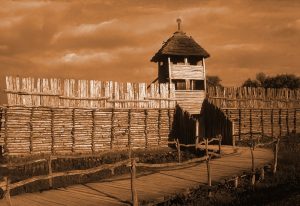
Fewer in number, we gather our things and start along a well-trodden path that runs into the reeds and brush. The trail is well-marked by the keen-eyed Elves but even we mere Men are easily able to follow the path. It leads uphill but follows a circuitous route from copse of trees to copse of trees. The trail-wardens who keep up the path have ensured that it takes advantage of every bit of cover available.
Our goal this morning is not the deep forest itself but rather Rhosgobel. Some people say the place does not exist. Others say it has been abandoned. Our Elvish companions assure us there are people living there. Rhosgobel is an outpost of Elvish power on the eastern side of the river, although they do not maintain any armies there. A garrison of Elvish warriors would only attract attention.
We eventually reach the treeline and amazingly the trail runs into a well-kept road that leads away north. The road is maintained by the Woodmen, our Elvish friends tell us. You cannot see them, we are warned, but they already know we are here. They are watching us. We exchange nervous looks among ourselves. The air is thick with tension and the ever-present sense of oppression. But we hurry along the road toward a fortified village where the gate-wardens warmly greet us and welcome us inside.
It is surely because of the Elves who are with us that the Woodmen accept us so easily. Elves do not travel with the servants of the enemy, unless they have taken them prisoner. Nonetheless we earn curious stares as we pass through the village. It is not very large but there are enough people here to require a large defensive wall. The name Rhosgobel is Elvish and is translated as “Brown Hay”. A hay is a defensive barrier, sometimes just a hedge, sometimes a wooden palisade. The “Brown”, we are told, is bestowed upon this Hay because of the village’s most notable inhabitant.
Radagast the Brown lives here. One of the Istari, those mysterious old men who wander about Middle-earth meddling in the affairs of Men and Elves, Radagast has long made his home in the forest. In fact, the sense of dread that permeates the atmosphere even down by the Gladden Fields is almost distant here. It is an undertone that has not quite faded away, but one feels if not hopeful of a bright future at least doubtful that all is lost.

It is in Rhosgobel that we will stay the night. There is a guest-house in the village. Not quite an inn, it can accommodate small groups of travelers. Normally it is abandoned but the Woodmen keep it in good repair just in case. The chief greets us and welcomes us. His companions are tall, dark-haired men. Each is armed with sword or axe. Many bear scars of battles past. You can almost feel safe in their company. Almost.
Next to the guest-house is the village ale-house. It is like the taverns of the western lands but more crude, rustic. A great hearth is lit with a roaring fire and the ale-master asks us about the lands we have visited. He is most interested to learn about the villages on the western side of the river. He has kin there. Many of the villagers do. We ask them why they haven’t fled the forest yet.
The ale-house grows quiet. Men stare at each other, dumb-founded. They cannot explain why they are still here. Some say they feel safe in Rhosgobel even though immense armies may be marshaled only a few days’ march from the village. Some say their hearts are in the forest. One old-timer says the woods still echo with the ancient songs of Elves. No one laughs when he speaks.
The truth is that Elves did once live in this part of the forest, but that was about two thousand years ago. Thranduil was their king. He led his people away when the forest first began to change, when evil took root in the southern regions. Amon Lanc, the ancient home of Thranduil’s family, was abandoned. Soon after he left a fortress began to rise on the slopes of the bald hill. It was dark and menacing and the hated Easterlings flocked to its service. In the early centuries the Northmen were strong and their kings did not fear the power of the Necromancer. But they fought with each other and eventually the Easterlings overwhelmed them.
A small remnant of the once mighty nations sought refuge in the forest. The fathers of the Eotheod settled in the Vales of Anduin near the Gladden Fields a thousand years ago. For a while they drove back the Easterlings. Soon afterward the Necromancer abandoned Dol Guldur. But within a few hundred years he returned. The Eotheod had migrated into the far north. Even the Dwarves of Khazad-dum were gone. And the Elves of Lothlorien had withdrawn into their golden woods, barring entrance to nearly all strangers.
In the past few centuries the forest has grown darker and more oppressive. Horrible creatures have claimed large tracts of the once fruitful woodlands. Companies of Orcs patrol many of the ancient paths, taking prisoners and slaughtering all who would oppose them. Every now and then a great leader rises up among the Woodmen, recruits a strong body of warriors, and he drives back the Orcs and the evil creatures. But then the warriors return to their homes and they sing songs about their great deeds. And they have no ambition to face the power of Dol Guldur. There are no kings to be found among them. Kings live in far away lands or in stories recited for children and visitors.
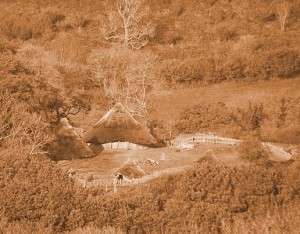
There are still villages, even isolated farms, deeper in the woods. The clans watch out for each other. They cooperate because that is the only way they can survive. But there is no talk of driving the evil away. The forest has become what it is and Men must wait for a change in the world before they can reclaim the woodlands. They fear that the Elves are now too few and weak to raise an army. And rumors from the distant north say that something dreadful dwells in the legendary Lonely Mountain: a great dragon. Men speak in whispers of the once prosperous Longbeard Dwarves, the Folk of Durin. They were driven from their ancient mansions in the Misty Mountains a thousand years ago. And then about 200 years ago their last great hall, the Lonely Mountain, was assailed and taken by the great dragon.
If any Longbeard Dwarves still live in the world, men say, they are few and distant. The ancient dwarven road that runs through the middle of the forest is no longer used on the eastern end. The once thriving town that stood there on the River Running has faded into old tales. Perhaps it is still there, perhaps not. Other legendary towns from the east include Dale and Esgaroth upon the Long Lake. No one knows if they yet stand, but most people say the dragon probably destroyed them. Dale was the last proud monument of the Northmen in their ancient northern world.
We bid our hosts good-night and return to the guest-house. Much to our surprise the Elves retire to their rooms. It is said that Elves don’t sleep but the yawns and weary expressions on our companions’ faces belie the rumor. Perhaps Elves can go without sleep longer than men, but they still welcome a soft bed and a warm room on a cold night. As we lay ourselves down we listen to the sounds of the Woodmen around us turning in for the night. Lifelong companions and kinsmen bid each other sleep well, but we know there are night-guards who will keep watch while Rhosgobel sleeps.
In the morning we say farewell to our Elvish companions. Their business is with Radagast but ours, alas!, is not. We eat a hearty breakfast and then quickly gather our gear and supplies. A small company of men is traveling deep into the forest this morning. They will visit other villages and we must go with them.
They are called Holtwards by the chief. He explains that each village sends out well-armed bands of men to ensure that the isolated farms have not been attacked, that the roads to nearby villages are still safe to travel, and to rescue stranded travelers. It is not safe to travel in the woods at night, even near Rhosgobel. The land here is wholesome and well-guarded but evil things still find their ways to the Brown Hay.
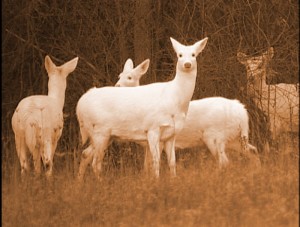
We have not gone far along our path when our companions quickly point out one of the rarest of rare sites: white deer. They are almost legendary creatures, believed by some peoples to be entirely mythical. Rhosgobel, our friends tell us, is the only village left in the southern forest that is visited by white deer. They are closely associated with the Elves in folklore because it is said that Thranduil used to hunt them. If he took any white deer into the north with him, not all wished for his company.
The Woodmen say they do not hunt the white deer. It is bad luck to kill one, they say. But the Orcs take great delight in tormenting the animals. Woodmen have been known to track down Orcs who have hunted white deer to take their revenge on them. It is said that no Orc has returned to its lair with the trophy of a white deer in more than 200 years. When we ask how the Woodmen can be so sure they shrug. “It is our way,” they say quietly. For a brief moment one feels a twinge of pity for the Orc that dares hunt a white deer. He will never see his home or kin again. And then we quickly wonder if Orcs even care about home and kin.
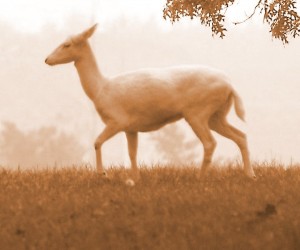
The deer are used to the Woodmen and they ignore our passing. Approaching the animals is discouraged but no one protests when we move closer to get a better look. They look much like ordinary deer but there is something … enchanting … about them. One doe looks up from her grazing and stares at us curiously. In some distant memory, perhaps, she might have wandered safely in the woods with Elvish songs all about her. It is the stags, however, that have earned the respect of the Woodmen. They swear they have seen old bucks fight off bands of Orcs. There is no love lost between the deer and the servants of the dark fortress.
We continue our journey through the woods. All around us the forest closes in but that oppressive feeling from yesterday is not as apparent. It is almost as if the will that had focused on us has turned its attention elsewhere. We ask the Woodmen about this and they say that life in the forest is fraught with peril. One learns to tread each path with caution, and that includes the paths that are watched by the darkness.
Men now call the forest Mirkwood because its eaves have grown dark and gloomy indeed. The trees grow so close together in some places it is impossible to pass through them. The Woodmen often have to cut back the brush and young trees to keep their roads and paths open. They gather on special days to service the roads in large numbers. The sooner they finish the task the sooner they can get back to their normal tasks.
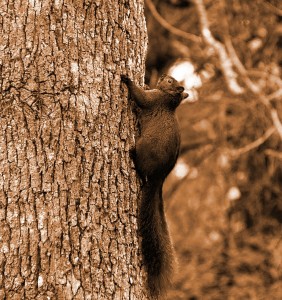
While traveling through the forest you are likely to see all types of creatures. We notice black squirrels following our small troop, skittering from tree to tree, perhaps hoping for a small morsel. The Woodmen say they do not feed the black squirrels but they are not evil. There are also birds of all sizes dwelling in the trees. At least in this part of Mirkwood there is abundant life and the day is filled with birdsong. But only a few days’ march north, our companions whisper, there are creatures that draw all the life out of the forest.
If Mirkwood is famous for anything other than Orcs, were-wolves, and vampires, it has to be spiders. There are spiders all around us but the Great Spiders are man-sized and larger. They have flooded the central forest with their webs. Wholesome creatures avoid those parts of the forest. Men dare not tread those pathways. Some say that even the Orcs fear to visit the lands of the spiders. Curiosity gets the better of us and we ask the inevitable question: if nothing dares venture into the land of the spiders, what do they eat?
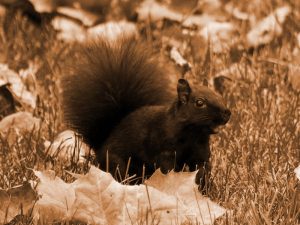
The Woodmen visibly shudder. Half of them turn pale. They look at us almost in complete and total disgust. We can read the answer in their hearts. Barslaga, the leader of the group, holds up his left arm. A long scar runs down it. He does not share the tale of that wound but we understand well enough. The spiders sometimes encroach upon the lands of the Woodmen, either hunting fresh prey or hoping to build new webs. The Woodmen fight the spiders almost every year.
A few skilled and gifted people among the Woodmen are Atterwards, poison wardens. They treat the venomed wounds of the warriors and store venom taken from the spiders. It is said that poisoned weapons are only used against the spiders themselves, and perhaps against other evil creatures. The road we are taking leads north toward Markway, a village near the edge of the lands held by the Woodmen. One of the most skilled Atterwards lives there. Our journey does not take us that far.
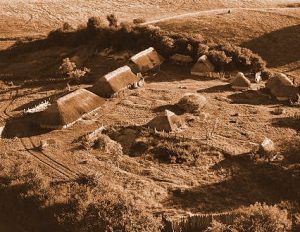
We arrive at a smaller village nestled deep in the woods. There are no white deer near us. Even the black squirrels seem to have turned back. But there are still signs of life. A black butterfly alights on a tree near us as we approach the village. It is not nearly as well defended as Rhosgobel. The people here call themselves the Wadolings. Their ancestor was named for the wandering moon. He was one of the occasional great leaders who rises up to drive the Orcs back. The village is still named named for him, Wadling.
Amazingly these Woodmen are farmers and miners. They guard a small vein of copper in the nearby hills. Metal is precious in the forest, even more so now that the Dwarves no longer bring trade. A little bit of iron, copper, and tin is drawn from the ground. It explains why some of these villages exist. Another village half a day’s walk east is called Isenholt. The smiths supply swords and axes to many of the Woodmen in the district. The village is thus a frequent target of Orc and Easterling raids.
There is no guest-house in this village. Our companions have to move on toward Markway. They warn us that the dangers are great but they warn us to turn back to Rhosgobel if we wish to wander through the woods by ourselves. We are too few in number to fight off the Orcs and even a lost spider might make short work of us. Given that inspiring vision we quickly agree to continue on to Markway.
On foot, following the paths through the forest, Markway is about 3 days’ journey from Rhosgobel. The forest path follows the landscape but seems to favor as many hills as possible. It takes us half a day to travel 10 miles because our companions must constantly scan the woods for signs of incursion. They are looking mostly for Orcs and spiders but they regale us with stories of were-wolves, vampires, and other creatures even more horrifying.
It is the phantoms, however, that drive most people away. They seem to be the tormented ghosts of the dead and no one knows where they come from. That the Necromancer controls them no one doubts. But how did such spirits come to fall prey to his power? The Woodmen say they don’t fear being trapped after death. They have never seen their close kin among the phantoms. But there is hardly a warrior among them who has not confronted one of the frightening apparitions.
The phantoms elicit great fear in those who behold them. They approach unwary travelers and fill their horses with fear. There are indeed few horses that live in Mirkwood. They are cherished by the Woodmen who own them but the beasts are seldom a match for the evil creatures that beset the quiet farms and villages. The woods are too dense for men to use cavalry effectively. The Woodmen thus fight on foot and most often travel that way as well. The phantoms come out at night when their power to instill fear is the greatest. But the heartiest of the Woodmen stand guard over their kith and kin at night.
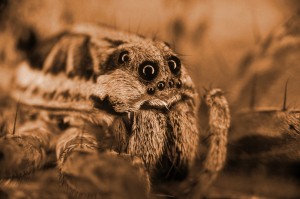
It is not clear how one fights a phantom. The Woodmen keep fires lit and the village guards carry torches. Perhaps the phantoms simply cannot affect their victims as easily in the light. Dogs sense them and bark furiously at their approach. In fact, the Woodmen keep great hunting hounds that accompany them into battle against Orcs, spiders, and other creatures. The dogs, our friends say, don’t fear the phantoms. But many a battle-hardened man has dropped his sword and fled in terror before the worst of the phantoms. They feel no shame for doing so.
We are approaching another village as night falls. There are no phantoms yet but our Woodmen are clearly glad to see that this village is well-defended. The guards welcome us and they already hold torches. As we enter the village curious folk come out to greet the Holtwards and ask for news from Rhosgobel. We are soon beset by children and men alike, thirsty for news of faraway lands. But nearly every family asks us about kin across the river. We cannot tell them much, but we have heard no tidings of recent battles. They breathe sighs of relief. Here and there, a pair of drawn faces exchange thoughtful glances. Although no one says anything it is evident that yet another family is weighing the risks and benefits of leaving the forest for life across the river.
The road to Markway is uneventful. We encounter no Orcs or wolves. We hear no news of battles or incursions. We meet two other parties of Holtwards traveling in different directions. It is plain that groups of Woodmen are constantly patrolling the woods in different directions. They share the burden of watching over each other even as they tend their flocks of sheep, raise their gardens, and carve little farms out of the endless sea of trees. The life of the Woodmen is quiet but tense. On the second and third days of our journey that oppressive feeling returns. The trees grow taller, closer together. The woods grow dim and the songs of birds seem faint and far away.
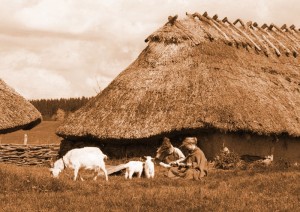
We cross small streams and even pass by a hidden lake. The hills gather about us and obscure the landscape in all directions. We manage to keep up with the Holtwards more because they are as tired and exhausted as we are. By the end of the third day we emerge from the woods into a wide meadow. At its center is the fortified village of Markway. A large road runs toward it from the west and we reach the road before we approach the village. The treeless meadow is very odd. Here in the heart of Mirkwood is a wide open space filled with green grass, grazing sheep, and there near the gate are children and a pair of goats.
And then as we walk toward the ever-alert village guards we see the stumps of trees all around us. This is no meadow. It is a killing zone. Markway is not simply a village on the edge of the Woodmen’s lands — it is a border post. But unlike Rhosgobel there is no benevolent wizard here to help keep the shadow at bay. No white deer greet us. There are only armed men and their hardened, suspicious children. If we were not accompanied by the Holtwards, it is made very plain to us that we might not have lived to reach the gate.
Markway is not a refuge, it is a defiant incursion into the forest. Men here expect battle. They live with daily horrors that melt the courage of brave warriors from other lands. The hard, grim faces are matched by hard, grim names: Wulfbane, Ashward, Ferthward, Grimmbrand, Aldbar. Warrior greets warrior with an open arm-clasp, the greeting of brothers in arms who have shared great perils.
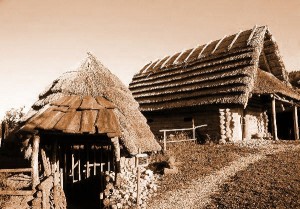
Markway has both a guest-house and an ale-house. We have barely settled in when the horns sound. The ale-house empties out as men rush toward the village wall. We are warned to stay away, out of danger, but we creep slowly up toward the gatehouse. Men stare hard into the night. A few throw torches out into the darkness. Just at the edge of the field of light cast by the flames we see something large skitter away with an angry squeal.
We settle in for a long night. We have reached Markway but we are not safe. The men get little rest as wolves set to howling about the perimeter. Thankfully the night passes without direct conflict. A few reports of phantoms are passed among the defenders but it appears that the arrival of our party was enough to keep the enemy at bay. Before dawn they slink off into the darkness.
But everyone knows that this was only a light skirmish. One day, perhaps soon, the forest will rise up in anger. It feels the weight of the oppressive will more each day. Men look south and know that one day the Necromancer will have his way with the forest. But on that day he will pay dearly for his ambition, for despite the fertive glances around the tables and the eager requests for news from across the river, few hearts are ready to let go of the forest. This is their home. They grew up here. And they are willing to fight for it.
# # #
Have you read our other Middle-earth Unplugged articles?
